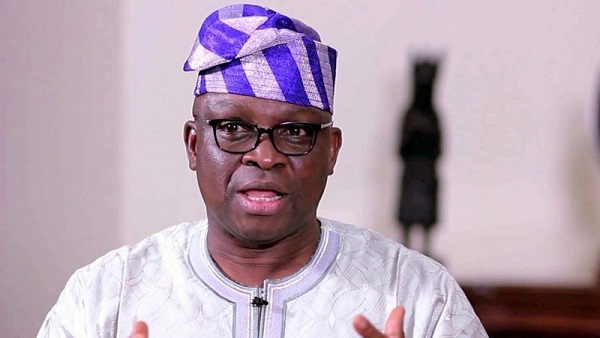Northwest demands lion share of revenue allocation to states, LGAs
• RMAFC explains why revenue formula has not been reviewed since 1992
• FRC cautions states on rising debt profile, reckless loans
• Threatens financial institutions against violating due process in granting loans
• Stop using consultants for tax collection, experts tell FG
• NYCN rally support for FIRS to tackle tax defaulters
Seven states from the Northwest, yesterday, asked the Revenue Mobilisation Allocation and Fiscal Commission (RMAFC) to give it lion share of revenue to state and local governments.
They argued that the two tiers of government should take 60 per cent while the Federal Government takes 40 per cent, pointing out that state governments are also saddled with funding of security apparatus, which is the sole responsibility of the Federal Government.
The states – Kaduna, Kano, Katsina, Sokoto, Jigawa, Kebbi and Zamfara – in their separate presentations, made the demand during the zonal public hearing on the review of the current allocation formula, held in Kaduna.
In the current sharing arrangement, the Federal Government (including special funds) is entitled to 52.68 per cent, while state governments get 26.72 per cent and LGAs receive 20.6 per cent.
In its presentation, Katsina called for 35 per cent for states, 25 per cent for local governments. The Commissioner for Budget and Economic Planning, Alhaji Farouk Jobe, said: “The revenue allocation was long overdue and its review is timely because it is getting to 30 years that the allocation was reviewed.”
Secretary to Kano State Government, Alhaji Usman Alhaji, lamented that the Federal Government was taking too much of the revenue. “Federal Government should take 41 per cent, states 34 per cent, LGAs 24 per cent and we need an independent one per cent for Kano because it is a mini-Nigeria,” he said.
The Jigawa State Commissioner for Finance and Budget, Alhaji Ibrahim Babangida Umar, proposed 44 per cent for federal, 34 per cent for states and 22 per cent for local government.
Kaduna State Permanent Secretary, Ministry of Finance, Mohammed Shuaibu, said: “Certain percentage be set aside for poverty/insecurity-ridden states, and 13 per cent derivation should remain, but extended to mineral resources.”
In his keynote address, host governor, Nasir el-Rufai, said: “The Federal Government retains the largest chunk of federation resources because it does too much but is too stretched and so does little well. Yet, the things that really matter to citizens are state and local government functions. For instance, basic and secondary education, primary healthcare and agriculture are sub-national responsibilities.”
The governor, who was represented by his deputy, Dr Hadiza Balarabe, said: “With the way things are, many states have to support the federal security agencies deployed within their jurisdictions, despite the fact that security is a federal responsibility.
“Therefore, the argument for a significant review, in favour of states, of the vertical revenue allocation formula is compelling. The Federal Government has to consolidate its focus around security, foreign affairs and monetary and fiscal policy. It should allow the states and the local governments to get more revenues to deliver better governance at the grassroots.
“The APC True Federalism Committee, which I chaired, had recommended a review of the revenue allocation formula in favour of the states. In my view, this is the most efficient way to adjust the finances of the federation while transiting to a wider devolution of powers and responsibilities. The progress and development of our country depends on well-functioning states. The revenue allocation formula is critical to that.”
Chairman of RMAFC, Elias Mbam, in his remarks, explained that revenue allocation was not reviewed for 29 years contrary to Constitutional provisions of every five years because of socio-economic and political changes in the country. The allocation was last reviewed in 1992.
He said the Commission was ready to present a new revenue sharing formula to the President for onward transmission to the National Assembly by December, adding that ongoing consultation and sensitisation across the country were aimed at avoiding past pitfalls that made past attempts to review the formula unsuccessful.
“As you may all be aware, RMAFC by virtue of paragraph 32 (b), part 1 of the Third Schedule to the 1999 Constitution (as amended) is empowered “to review from time to time the revenue allocation formula and principles in operation to ensure conformity with changing realities, provided that any revenue formula, which had been accepted by an Act of the National Assembly shall remain in force for a period of not less than five years from the date of commencement of the Act.
“In line with the above constitutional provision and the fact that there had been several socio-economic and political changes in the country since the last review in 1992, the Commission has commenced the process of reviewing the subsisting revenue allocation formula to reflect these changing realities. Accordingly, the Commission has designed processes and guidelines to ensure adequate participation of Nigerians,” the RMAFC boss said.
MEANWHILE, the Fiscal Responsibility Commission (FRC) has raised concern over increasing debt profile of states and looming volatility to the nation’s economy. Besides, the Commission has threatened to invoke legal action against commercial banks and other financial institutions already turning themselves into willing tools of “fiscal carelessness” by granting loans to states without recourse to due process as outlined in Fiscal Responsibility Act 2007.
Chairman of the Commission, Victor Muruako, who issued the warning, yesterday, during a sensitisation workshop on fiscal transparency and accountability in Kano, lamented failure of many state governments to adopt prudent management of their resources.
Muruako, who explained that current situation of the nation’s economy requires fiscal responsibility from all tiers of government, is worried that sub-national authorities had neglected their commitment to the Fiscal Sustainability Plan (FSP).
Muruako warned the state governments, who already formed the habit of making loans their first and last consideration for meeting revenue shortfalls, to desist, while urging them to focus more on harvesting their dormant potentials for Internally Generated Revenue (IGR).
The FRC boss stressed that despite the Federal Government’s intervention to rescue states from meeting their financial commitment, only 22 states had so far adopted Fiscal Responsibility Act, a conditional commitment that will ensure governors manage public resource with transparency, accountability and prudence.
“To this effect, bailout loans were issued, which carried a conditionality that benefiting state governments should commit to a fiscal sustainability plan. Sadly, four years down the line, many of the state have not met that expectation. Only 22 out of 36 have enacted the Act.”
Earlier, Governor Abdullahi Umar Ganduje pledged to commence the process of domesticating the Fiscal Responsibility Act in Kano.
EXPERTS on taxation, economics, public policy and media have urged the Federal Government to take urgent steps at ensuring fiscal prudence, particularly with regards to revenue generation and collection, advising against the use of consultants in the tax regime, which they argued is detrimental to national revenue drive.
This was part of the communiqué issued at the end of a one-day public policy forum on ‘Fiscal Governance and Economic Resilience in Nigeria: Emerging Issues and Policy Options’ organised by the Partnership to Engage, Reform and Learn (PERL), a United Kingdom Foreign, Commonwealth and Development Office (FCDO)-funded programme, held in Abuja, yesterday.
National Team Leader of PERL, Dr Adiya Ode, in his welcome remarks, recalled the ongoing case between Rivers State and the Federal Government on the collection of Value Added Tax (VAT).
He said: “The furore it has generated and the analyses thereafter are a reminder of the vulnerability of many of our economies at both state and federal level. In fact, it highlights the fact that many of our states do not have functional economies and are subsisting on allocations. But it doesn’t have to be like this.
“In 2015, Nigeria experienced a recession with a massive decline in GDP growth rate from 6.7 per cent in 2014 to 2.7 per cent in 2015. There were deliberations and discussions about fiscal sustainability to strengthen the economy of the states and build economic resilience.
“Despite these efforts, here we are on the brink again. Nigeria has a dubious honour in topping many of the negative HDI charts, ranking alongside countries like Iraq, Afghanistan, and D.R. Congo, who have experienced devastating wars. Even without the widespread insecurity currently bedeviling the space, service delivery especially in the health and education, is stagnated,” he stated.
At the end of the dialogue, participants recommended the need to reinvent Nigeria’s fiscal governance, which they said will require complementary reforms to strengthen formulation and execution of the budget.
“The use of consultants in the tax regime is detrimental to national revenue drive, and thus, there is need to institute a vibrant revenue generation drive by public institutions instead of using consultants,” the communique stated.
Participants also asked for synergy and coordination among government agencies in fiscal governance in the implementation of the major frameworks, adding that innovative fiscal policies administration required in tackling underperforming or performing revenue generation mechanism of the agencies at both national and sub-national levels is key in effective fiscal governance in Nigeria.
Other recommendations were the need for public financial management reforms that will have a greater impact on transparency and accountability.
“The need for an integrated revenue architecture at the national and subnational levels working independently to enhance revenue drive in the robust fiscal governance of Nigeria. Also, the need for urgent legislation to guarantee the independence of Auditor General of the Federation to enhance efficiency, transparency and accountability at all levels of governments.”
IN a related development, the National Youths Council of Nigeria (NYCN) has rallied the support of Nigerians to assist authorities of the Federal Inland Revenue Service (FIRS) to tackle tax defaulters in the country. The group, led by Mr Solomon Adodo, frowned at attempt by tax defaulters in the country to intimidate the chairman of FIRS, Mr Muhammad Nami, to abdicate in his responsibility to boost IGR in the country.
He said: “We know that some people somewhere would wish to continue with their tax crimes. But we say a big no to that. It is about time that, as Nigerians, we focused on development instead of petty politics.
“The determination of the Nami-led FIRS to go after some big and hitherto untouchable tax offenders has continued to gain traction. For example, many businesses that either did not pay taxes or did not pay the correct amount have been made to pay under the very deliberate programme of the FIRS. The drive continues, as that is what is obtainable everywhere in the world.”
The NYCN in conjunction with some Civil Society Organisations (CSOs) promised to carry out advocacy programmes to educate and sensitise Nigerians, especially the youth, on their roles in improving revenue generation by supporting and deepening the expansion of the National Tax Net.







